
Mining for a Sustainable Future: A Symposium on Responsible Supply Chains

By Zolzaya Jargalsaikhan
“For most of the people the world ends at the North Shore Mountains, and there is nothing beyond that. It is very urban. That is an impediment to get more students involved in mining. We need more coming out of buildings and availability of other career options..”
– Scott Dunbar.
“Things are very good with the right team at the right moment. And then we forget what we're dealing with is a forever problem, is a community problem, whose story has been intersected, whether it's in artisanal mining or industrial mining. The problems with tailings, the problems with chemical separations. These are going to be ongoing and solving it once usually isn't enough. You have to have the commitment and the fortitude to keep showing up. Keep asking, keep innovating, to make sure that things are happening in a way that is okay.”
– Katherine Standefer
“If our goal is to get the metals we need, for example, for clean energy transition, but minimize the harms from that, then I would argue that it's our responsibility to basically make the most of metals that are above ground, whether they're in the products we're using, whether it's ramping up or trying to find ways to ramp up recycling rates, which are, I was astounded at how lousy they are for metals. ...The circular economy, is absolutely critical for us to pursue in a serious way. We're serious about minimizing the harms from mining, unless it's just another way to make money and move forward that way. And I think it's possible, but it's not very encouraging. I think it's going to start at the grassroots.”
– Christopher Pollon

About the event
On March 27th, 2024, the UBC Sauder's Centre for Climate and Business Solutions and the Bradshaw Research Institute for Minerals and Mining joined forces to host a thought-provoking symposium titled "Mining for a Sustainable Future." This event aimed to spark critical discussions and build collaborations within the research community focused on innovative and responsible mining practices.
The symposium featured two compelling keynote speakers. Award-winning journalist Christopher Pollon shared insights from his investigative reporting on the global mining industry, particularly its role in the green energy transition. Katherine Standefer, a renowned author, explored the complex ethical considerations surrounding the mining supply chain for medical devices, highlighting the trade-offs between technological advancements and their social, environmental, and economic impacts. Both speakers shed light on the crucial need for critical minerals while acknowledging the challenges of unsustainable practices and the importance of climate justice.
The event continued with a dynamic discussion moderated by the Kookai Chaimahawong, Executive Director of the Centre for Climate and Business Solutions. Joining her were panelists Scott Dunbar, author of "How Mining Works” and Christopher Pollon and Katherine Standefer, who engaged in a lively exchange on topics including the importance of values, community impact, innovation, and long-term commitment. Speakers emphasized the need for education and better understanding of industry practices to bridge public perception and knowledge gaps. They also discussed the importance of rethinking business models and considering the long-term impact of mining on local communities and the environment.
The event ended by the research pitches by the Postdocs and graduate students across The University of British Columbia disciplines.
PART 1: Authors Keynote: Stories of Impact
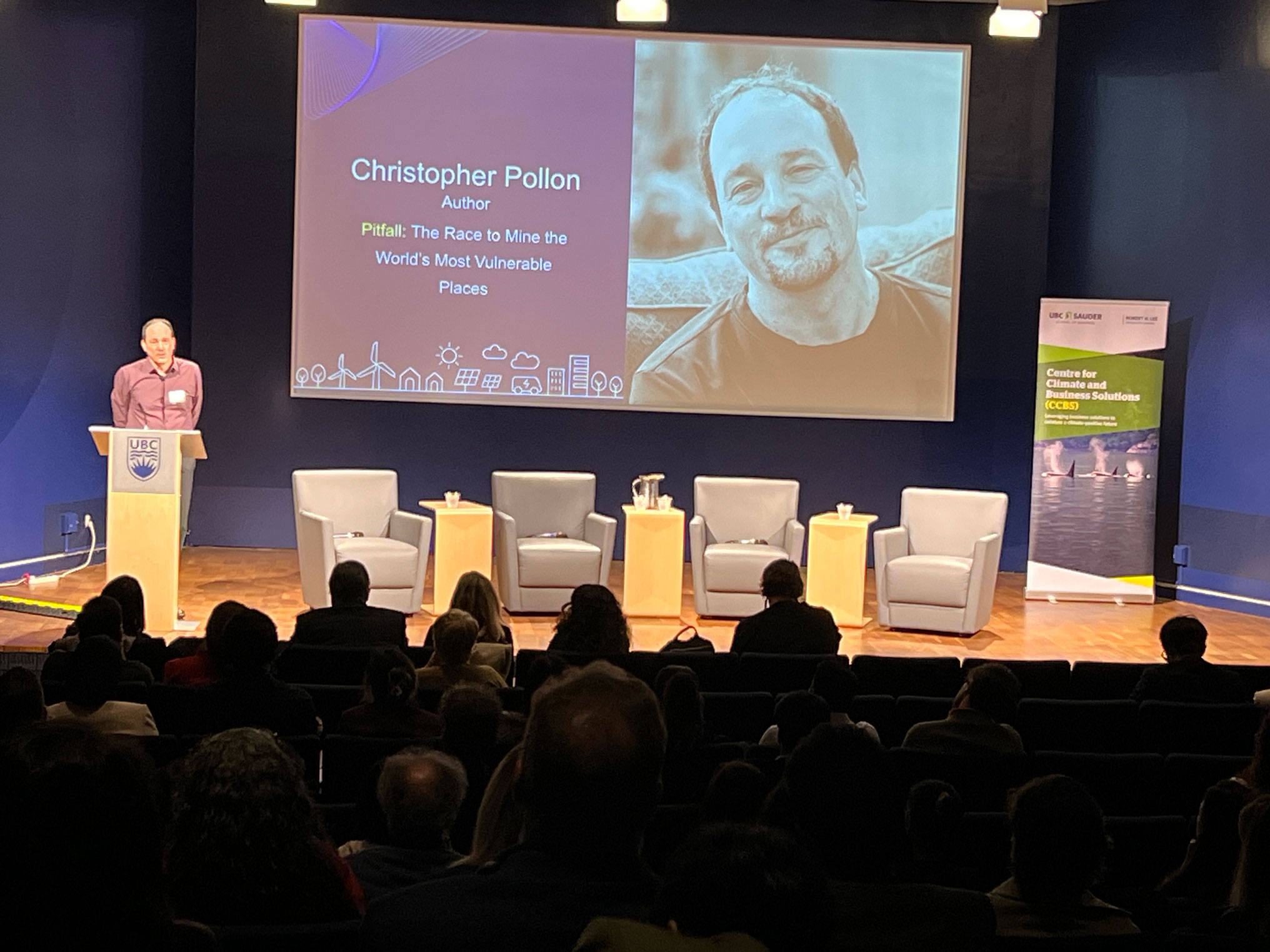
Christopher Pollon
Christopher Pollon, author of Pitfall, discussed mining's invisible impact on society despite its crucial role in modern life during his keynote speech. His family worked in gold mines in Timmins, Ontario for generations. Hence, the topic is very dear to his heart. To draw the audience’s attention, Christopher highlighted that everyday items, like our phones, contain at least 60 elements, including rare earth elements.
Sustainable mining, climate justice were the key concerns he highlighted throughout his speech. Moreover, he identified social license to operate and metal grades as major challenges for the mining industry. Most importantly, he mentioned that climate change will impose limits on what we can extract. Christopher gave examples of what he saw while he did his investigative research. One of it was water crisis in Chile due to drought. However, mining still took place with use of high-tech water extraction methods in their operations, showcasing what larger companies are doing to extract minerals.
Additionally, Christopher emphasized the importance of climate justice and responsibility in the clean energy transition. He noted that the energy transition itself is metals-intensive, discussing the use of mining and metals in solar energy production. For instance, a solar energy plant that powers about 10,000 North American homes requires over 200 tonnes of copper, 45 tonnes of manganese, 4.5 tonnes of silver, and about 15,000 tonnes of steel. And that's only for the first generation, as the plant will only have a lifespan of about 30 years. The need for mining is increasing. So does the climate footprints.
He ended his keynote speech by reading a quote from an Indigenous person featured in his book, stating, "Climate action is not the same as climate justice. Instead of thinking you have the right to buy your electric car, you must question what your responsibility is in your style of life, your way of living and consuming, like importing a lot of stuff from China and throwing everything in the garbage. Climate justice addresses the responsibility for the climate crisis, who caused it, and who should pay for it.”
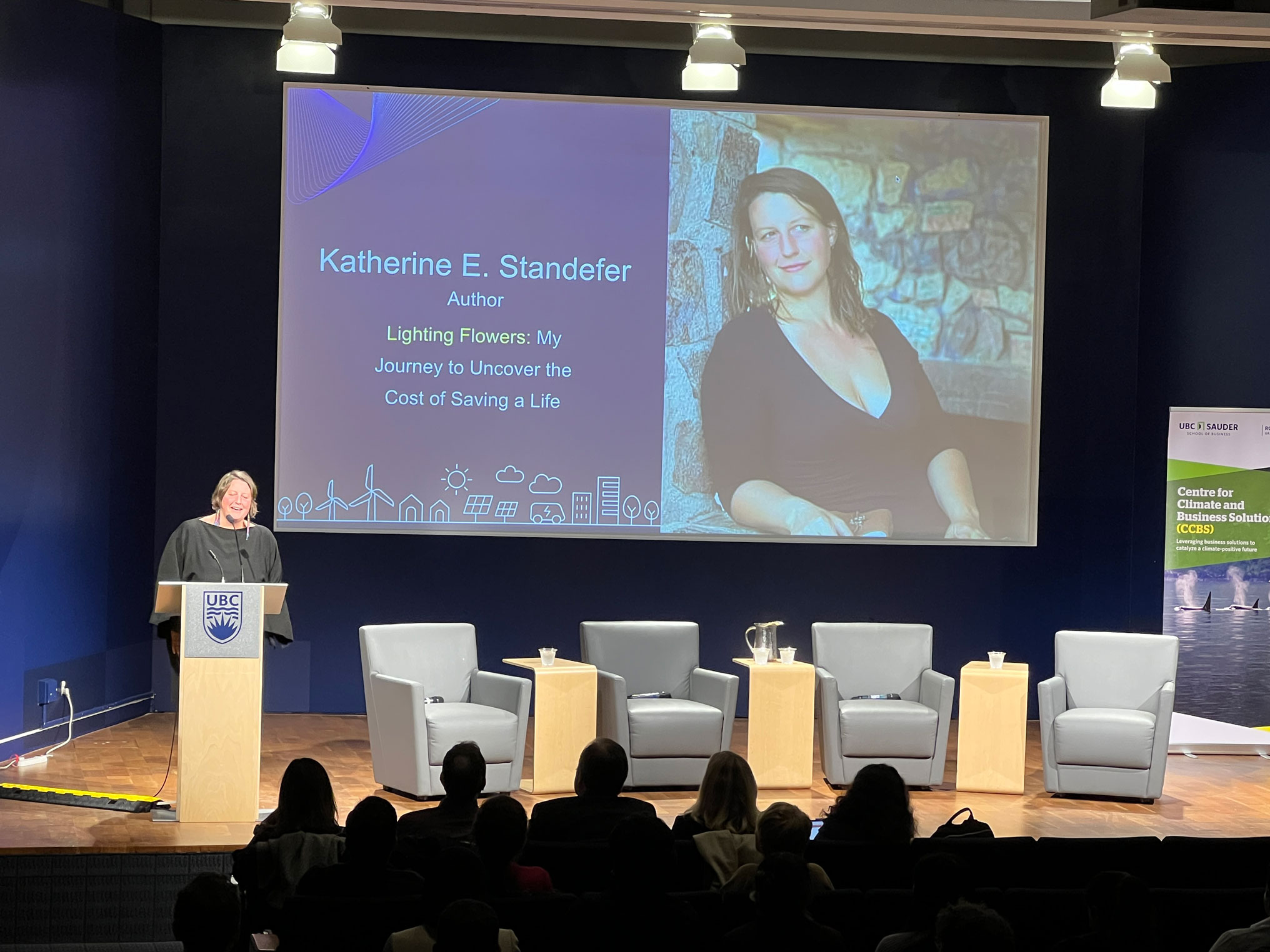
Katherine E. Standefer
Katherine Standefer's keynote speech emphasized the impacts of mining and its ethical considerations, specifically in the context of medical devices. She shared her personal and compelling story, detailing her journey to explore the origins of the metal in her body and questioning the ethics of mining.
Katherine drew from her eight years of research on mining, including visits to various mining sites. She visited a nickel and cobalt mine in Madagascar, where she met with local elders who had lost access to their ancestral forests. She also visited a conflict-free tantalum and tungsten mine in Rwanda and observed workers in mixed conditions. Additionally, she explored mining sites in Congo, witnessing forced labor and its impact on local communities.
Furthermore, Katherine discussed the environmental impact of medical technologies' waste. She provided a striking insight into the disposal of cardiac devices that are discarded after removal from the body. She argued that medical technology has significantly altered the nature of the earth and questioned why the devices are not being “recycled”. Through her examples, she concluded that resource extraction is destructive and highlighted our cultural unwillingness to reassess resource use. She stated, "All resource problems are cultural problems. We are a culture that believes in technology as a kind of savior. There's this enormous mythos around it. The technological solution is alive. And technology isn't going to let us down is the sense in general. Yes, we're super worried about the patient and we trust in technology. We trust that the technology will outweigh any of its own baggage. So we use it as this kind of insurance plan in various ways. In my own story, unfortunately, technology has not been a savior in addition to those accidental shocks."
PART 2: In-Depth Dialogue: A Panel Discussion
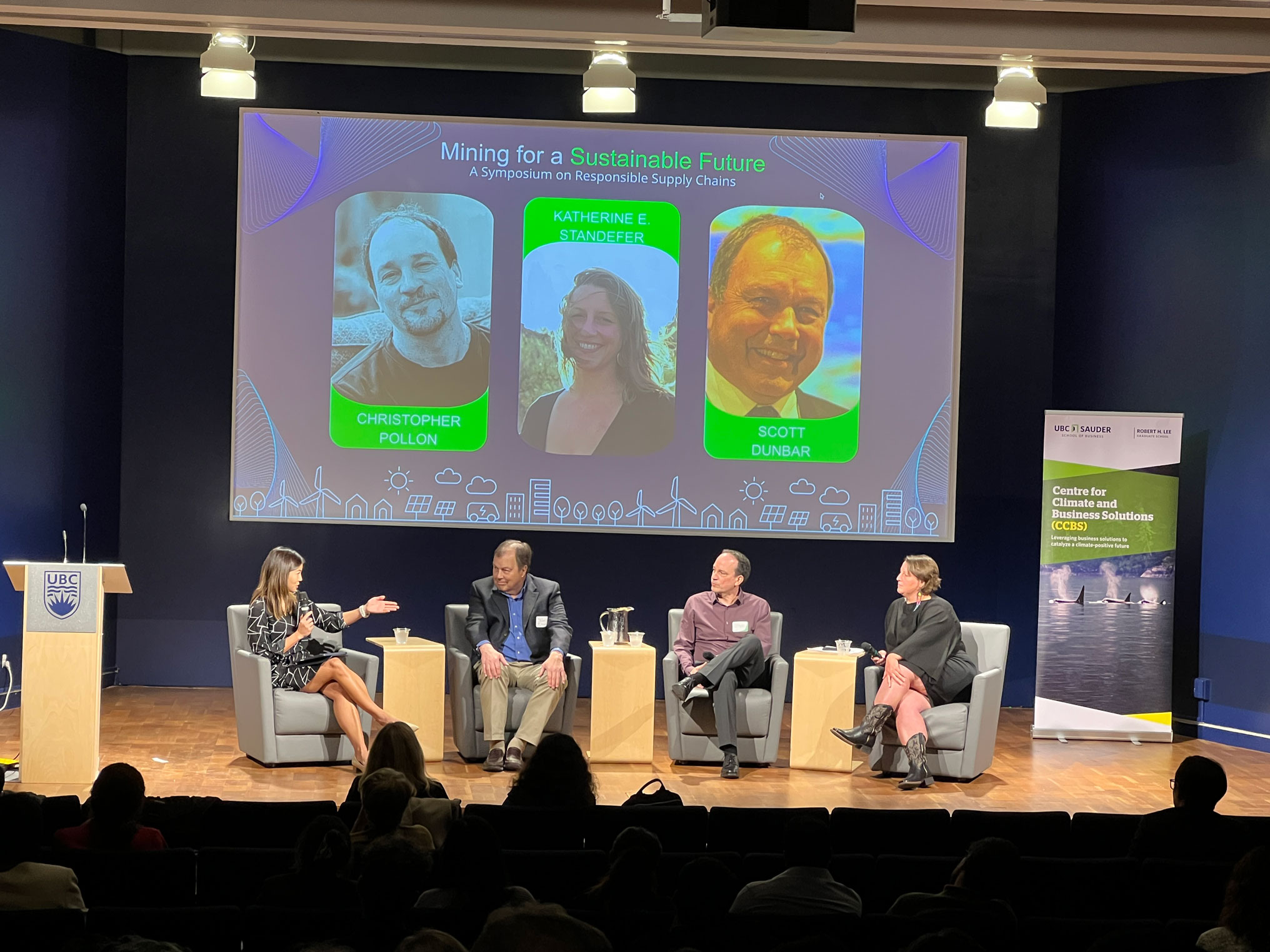
The event continued with a dynamic discussion moderated by the Kookai Chaimahawong, Executive Director of the Centre for Climate and Business Solutions. Joining her were panelists Scott Dunbar, author of "How Mining Works” and Christopher Pollon and Katherine Standefer, who engaged in a lively exchange on topics including the importance of values, community impact, innovation, and long-term commitment.
Importance of stories and narratives in mining sector
Scott Dunbar emphasized the central role of stories and narratives in society and particularly in the mining sector. He believes that increasing engagement and involvement from a broader range of people in the mining supply chain is crucial. Dunbar advocates for more people to be actively involved in building and shaping the industry's future, suggesting that anyone can contribute in some capacity. His current focus centers on understanding the metals supply system and exploring potential adjustments to it, along with reimagining the business models for mining organizations.
Mining industry's impact, values, and innovation
Katherine highlighted the importance of persistently and deeply questioning and re-evaluating practices, especially in industries like mining. She emphasized that solutions require ongoing commitment and innovation, rather than one-time fixes. She highlighted how cultural values and systemic designs, often invisible, shape our approaches and outcomes. Specifically, good intentions in mining often falter due to market fluctuations and changing partnerships, stressing the need for continuous effort to address long-term community and environmental impacts.
Mining industry's impact on the environment and society
Christopher's investigation into mining, particularly in the Global South, revealed some surprising and impactful findings. From his visit to an underground mine in Bolivia he saw extreme working conditions, where miners were working in a labyrinthine network of tunnels. Most of these miners, predominantly young men, were unlikely to reach the age of 50 due to the harsh conditions.
A key revelation to him was the dominance of artisanal mining, with around 45 million people globally working in conditions similar to those he observed. This form of mining, especially for gold, is a critical economic activity for many living hand to mouth. Despite being a global crisis due to its hazardous nature, artisanal mining also represents an economic opportunity for the world's poorest. He mentioned that he had to confront and accept the fact that we need to find ways to coexist with this practice and improve conditions, as eliminating it is not feasible.
Education and career opportunities in mining industry
Scott emphasized the need for producing more generalists rather than solely technical experts. While technical skills are necessary, the industry also needs professionals who can understand and navigate policies, local politics, environmental issues, and other broad-ranging factors. The industry benefits from individuals with diverse skills who can work in various roles, from rock mechanics to community engagement and governmental organizations. He also suggested that universities should foster a broad-scale thinking approach for mining: perhaps create a Bachelor of Mining, just like Bachelor of arts and sciences. This way, graduates can better adapt and contribute to the versatile demands of the mining industry.
When asked about the reason why mining schools around Canada are closing down, Scott noted that engaging students early on is crucial. Each year the number of students interested in studying Mining goes up and down. Many come with little understanding of what mining implicates, making it challenging to explain the field's scale and opportunities. Additionally, the urban-centric mindset in places like Vancouver can impede interest, as many students see little beyond the city's immediate environment. For most of the people the world ends at the North Shore Mountains, but there is a world beyond that. To address this, providing more comprehensive educational outreach and highlighting the diverse career paths within mining is critical.
Circular economy and Policy changes
Christopher emphasized the need for serious pursuit for a circular economy. This means creating systems where products and materials are continuously reused and recycled, reducing the need for new mining. Starting locally through grassroots initiatives can drive significant change from the ground up. He also mentioned that governments and industries need more than just a talk. While circular economy goals are often discussed, concrete actions and policies need to follow.
Sustainable mining, community development
At the end of the panel discussion, Katherine addressed how the challenges in the mining sector can be tackled. For instance, she shared how companies could adopt disruptive design principles, embedding new values into their operations to promote sustainability and community benefit. Inspired by a clothing library and a recycling center in Denmark, mining companies can transform one-time extraction profits into long-term community capital. This involves ensuring that mining benefits extend beyond immediate economic gains and addressing governance issues that may prevent local communities from benefiting.
The powerful message she shared with the audience was that her role as a writer is to hold stories too large for any single discipline to encompass. She expressed a longing to bring together diverse groups of people who think differently, fostering innovation through new perspectives. The audience at the event exemplified this, showcasing the potential of interdisciplinary collaboration.
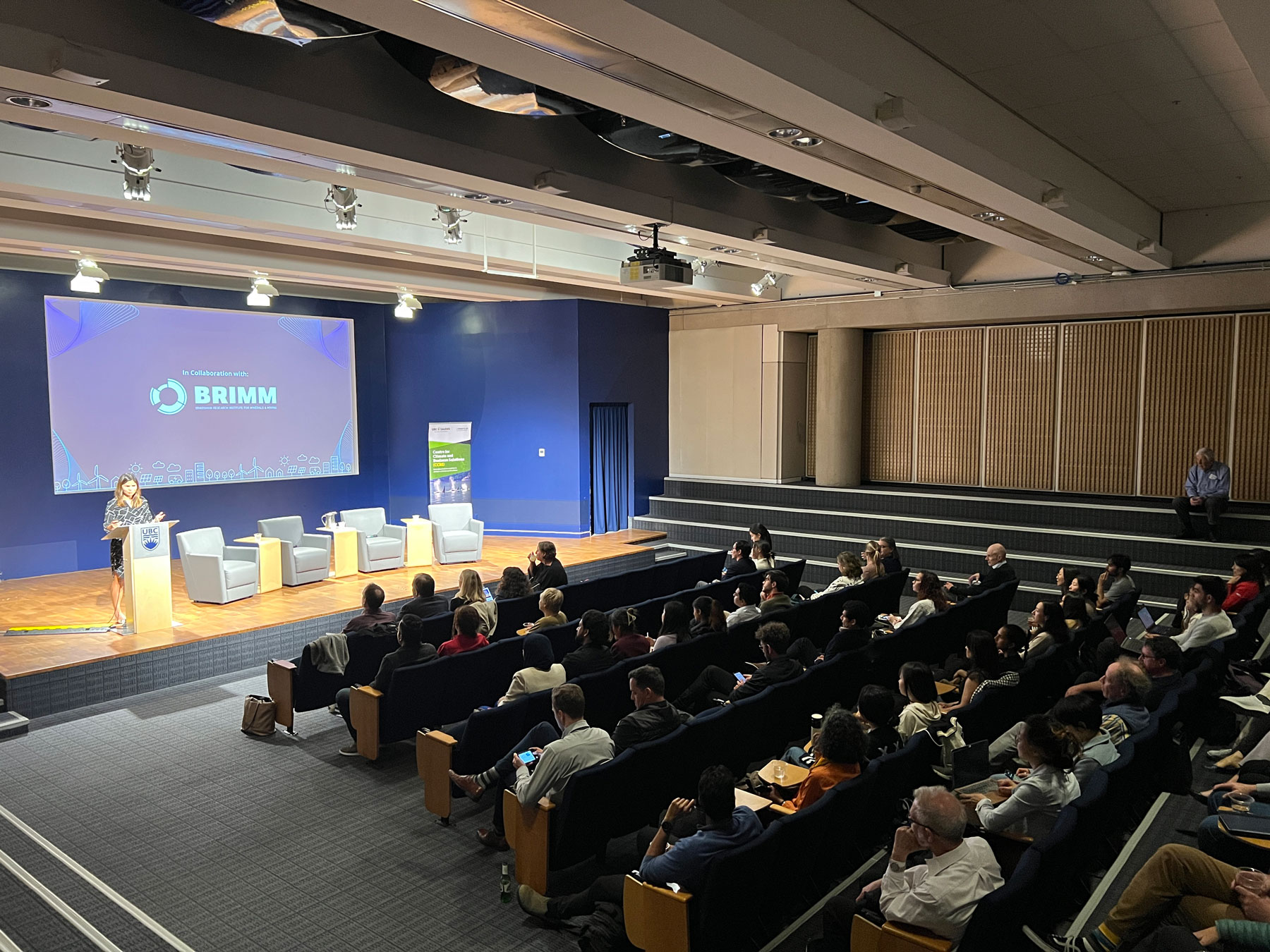
Questions from the audience
Role of Canadian mining companies in the Global South: Chris has shared his opinion on how Canada is a mining power with a significant global presence, particularly in mining exploration. While it may not dominate through major mining companies, Canada specializes in junior mining companies, a concept likely invented in Canada. These nimble corporate entities are designed to raise risk capital, and about 50% of the world's publicly traded mining companies are Canadian, primarily focused on exploration. Canadians are active worldwide, but also has a checkered history. Some of the federal government's promises were unfulfilled, hence there is still room for significant improvements.
Making the mining industry more visible: Katherine mentioned how making the mining industry more visible is a complex issue. The internet can amplify its visibility. As seen during COVID-19, the supply chain issue revealed itself, the mining issue can also reveal itself. The challenge lies in balancing individual actions and systemic changes. Effective policy support is crucial, such as funding think tanks and institutes that promote circular economy practices. This approach can spark conversations and drive systemic change. Media outlets, journalists, and podcasts play a vital role in raising awareness, but larger efforts are needed to highlight the industry's importance. The right leadership in government or NGOs can also catalyze significant momentum and visibility for the mining sector.
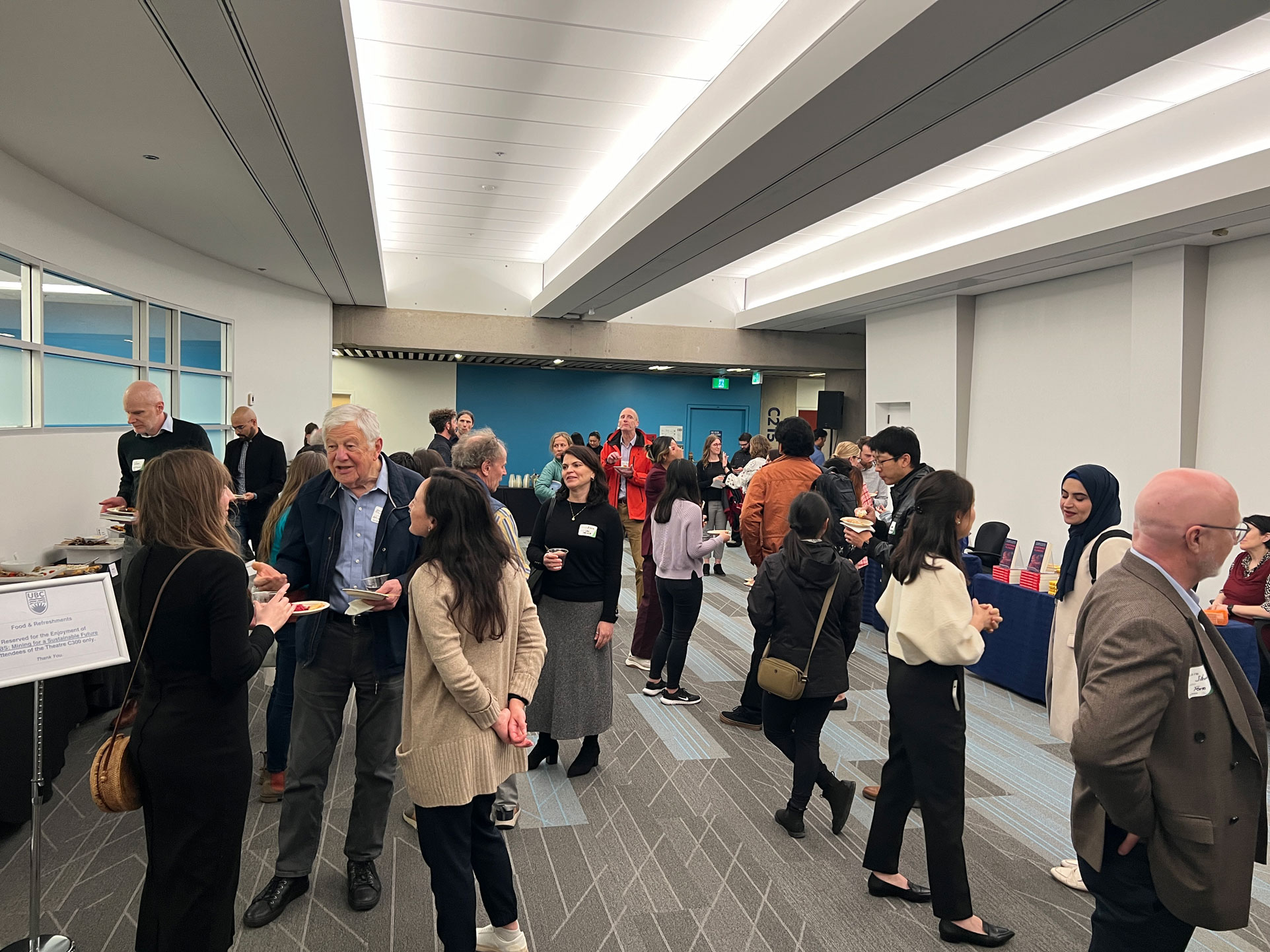
PART 3: Discovering Solutions: Research Pitches

Researchers from UBC’s multiple disciplines presented their innovative work on making mining more sustainable. The pitches included Elaheh Ghasemi's work on nature-based solutions at the interface of forestry and mining; Mehdi Golzar Ahmadi’s work on recovery of metals using microbes that can survive in extreme acid environments; Rohan Sharma’s exploration of urban mining and addressing both metal recovery and wastewater remediation and Juliette Engelhart’s tracking system on responsible supply chains in mining to allow them to be transparent and accurate.
Invitation to collaborate
This was the first time the Climate Center hosted a symposium and good news is more symposiums are on the way. Through symposiums, the Centre is trying to bring together diverse perspective and unite everyone in finding solutions. The Center is looking for collaborators on a new project focused on innovation and investment mapping of the Canadian mining ecosystem.
Please reach out to climatecentre@sauder.ubc.ca if you’d like to collaborate with us on this project.
Next events by the centre
ESG for SMEs Symposium (June 25, 2024): Small businesses are the backbone of British Columbia's economy, making up 98% of all businesses and employing over one million people in the province. Yet, they often face unique challenges when integrating Environmental, Social, and Governance (ESG) principles into their operations.
The ESG for SME Symposium, hosted by the UBC Sauder's Centre for Climate and Business Solutions in collaboration with the ESG Centre of Excellence, on 25th of June, 2024, aims to provide practical insights, showcase how SMEs have successfully integrated ESG into their operations, respond to investor requests, and work with larger corporations within the supply chain.
Join us for practical insights, engaging discussions, and networking opportunities to help your SME thrive in a sustainable future.
Stay in touch
Discover what’s new in our recent announcements.
Read about our latest research, led by our responsible leadership at the forefront.
Keep connected with our community.